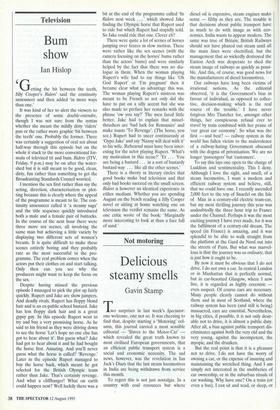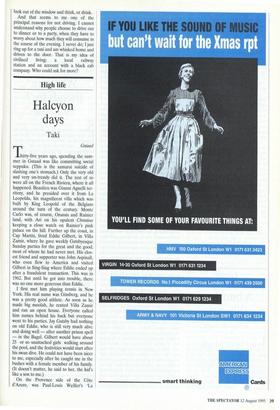Not motoring
Delicious steamy smells
Gavin Stamp
Two surprises in last week's Spectator: one welcome, one not so. It was cheering to find that, despite starting a 'Motoring' col- umn, this journal carried a most sensible editorial — 'Slaves to the Motor-Car' which revealed the great truth known to most civilised European governments, that an efficient public transport system is a social and economic necessity. The sad news, however, was the revelation in Ian Jack's Diary that the last steam locomotives in India are being withdrawn from service this month.
To regret this is not just nostalgia. In a country with coal resources but where diesel oil is expensive, steam engines make sense — filthy as they are. The trouble is that decisions about public transport have as much to do with image as with eco- nomics. India wants to appear modern. The same was true of Britain; British Railways should not have phased out steam until all the main lines were electrified, but the management that so wickedly destroyed the Euston Arch was desperate to shed the steam image of railways as quickly as possi- ble. And this, of course, was good news for the manufacturers of diesel locomotives.
Our railways have long been victims of irrational notions. As the editorial observed, 'it is the Government's bias in favour of individual, as opposed to collec- tive, decision-making which is the real source of the trouble.' I have never forgiven Mrs Thatcher for, amongst other things, her conspicuous refusal ever to travel by train combined with her praise of `our great car economy'. So what was the first — and best? — railway system in the world has fallen victim to the malevolence of a railway-hating Government obsessed with the dogma of privatisation. We are no longer 'passengers' but 'customers'.
To say this lays one open to the charge of Luddism and sentimentality. This I deny. Although I love the sight, and smell, of a steam locomotive, I want a modern and efficient railway system and believe, still, that we could have one. I recently ascended 2,000 feet to the top of Snaefel on the Isle of Man in a century-old electric tram-car, but my most thrilling journey this year was undoubtedly the three hour trip to France under the Channel. Perhaps it was the most exciting journey I have ever made, for it was the fulfilment of a century-old dream. The speed (in France) is amazing, and it was splendid to be able to walk straight from the platform at the Gard du Nord out into the streets of Paris. But what was marvel- lous is that the journey was so ordinary; that is just how it ought to be.
By now it must be obvious that I do not drive. I do not own a car. In central London or in Manhattan that is perfectly normal, but in car-besotted Glasgow, where I now live, it is regarded as highly eccentric even suspect. Of course cars are necessary. Many people clearly cannot do without them and in most of Scotland, where the railway system has been (and still is being) massacred, cars are essential. Nevertheless, in big cities, if possible, it is not only desir- able not to drive, it is almost a public duty. After all, a bias against public transport dis- criminates against both the very old and the very young, against the incompetent, the myopic, and the drunken.
But the real point is that it is a pleasure not to drive. I do not have the worry of owning a car, or the expense of insuring and maintaining the wretched thing. And I am simply not interested in the snobberies of car ownership, or in the suburban rituals of car washing. Why have one? On a train (or even a bus), I can sit and read, or sleep, or look out of the window and think, or drink.
And that seems to me one of the principal reasons for not driving. I cannot understand why people choose to drive out to dinner or to a party, when they have to worry about how much they will consume in the course of the evening. I never do; I just ring up for a taxi and am whisked home and driven to the door. That is my idea of civilised living: a local railway station and an account with a black cab company. Who could ask for more?



















































 Previous page
Previous page